
Cornelius Krieghoff Painting Reproductions 1 of 6
1815-1872
Canadian Romanticism Painter
Across the restless decades that shaped the North American colonies into nations, Cornelius David Krieghoff traced a life that was itself a kind of voyage - from the mercantile canals of Amsterdam to the icy rivers of Quebec, from the battlements of a Florida encampment to the polite parlours of Montreal. His canvases remain testimony to a sensibility at once rigorous and humane, alert to the cadences of daily labour as well as to the lyric isolation of a snowbound horizon.
Born on 19 June 1815 in Amsterdam, Krieghoff was the son of Johann Ernst Krieghoff, a craftsman whose appointment to Wilhelm Sattler’s wallpaper manufactory carried the family upriver to Schloss Mainberg. The medieval castle, improbably transformed into an industrial locus, offered the boy a dual education: the precision of design demanded in decorative surfaces, and the lingering romance of turreted silhouettes. Under his father’s guidance he learned draftsmanship before a formal enrollment, c. 1830, at a German academy of fine arts, where the disciplined study of anatomy and perspective tempered what was already a quickening eye for anecdotal detail.
In 1836 Krieghoff crossed the Atlantic to New York and, a year later, enlisted in the First Regiment of Artillery. The military interlude was no mere hiatus. Posted to the humid theatres of the Second Seminole War, he filled sketchbooks with observations of improvised fortifications, marshland flora, and the complex choreography of soldiers and Indigenous combatants. Those drawings, later lost to the Great Quebec Fire of 1881, nevertheless informed a lifelong habit: the immediacy of field notation that would underpin finished oils.
Discharged as a corporal in 1840, Krieghoff turned again toward Europe, refining his draughtsmanship in Paris under Michel Martin Drolling. The Louvre’s encyclopaedic riches provided a lexicon of pictorial possibility, yet his copies of Old Masters were less acts of homage than exercises in adapting inherited syntax to future narratives set far from classical ruins or fashionable boulevards.
By 1846 he had resettled in Montreal with his wife, Émilie Gauthier. There, amid a bourgeois society intent on articulating its cultural stature, he helped found the Montreal Society of Artists (1847). More profoundly, he ventured south to the Kahnawake reserve, sketching Mohawk hunters and domestic interiors with a sobriety that avoids both sentimental exoticism and ethnographic distance. These encounters enlarged his thematic range, granting his later genre scenes an authenticity born of first-hand acquaintance with First Nations communities.
A further migration in 1853 took the family to Quebec City. The next decade yielded a prodigious sequence of winter tableaux - horse sleighs lashed with steam as they hurdle tollbooths, voyageurs pausing at frozen cataracts, loggers guiding timber rafts beneath brittle skies. Such images rest on compositional clarity: the long diagonal of a riverbank, the contrapuntal accents of scarlet sashes against a field of white. Yet their enduring appeal lies in a psychological insight that resists anecdotal charm; labour, commerce, even leisure are shown as negotiations with an environment both indifferent and magnificent.
Krieghoff’s palette, often described as unusually high-keyed for mid-century practice, served tactical ends. In Montmorency Falls a turquoise shadow clarifies the geometry of ice; in Lake St Charles the mica-like sparkle of snow articulates surface before depth, inviting the viewer to inhabit rather than merely observe the scene. His brushwork remains controlled, edging toward meticulousness, yet never static: a thin glaze modulates the translucence of atmospheric vapor, while thicker impasto marks the refractory crunch of compacted snow under hoof.
Though he exhibited and sold widely, Krieghoff was restless. Between 1863 and 1868 he revisited European centres, absorbing contemporary debates on realism without abandoning his own pragmatism. Ultimately he retired to Chicago in 1868, where the brisk commercial buoyancy of that city could not forestall declining health. He died there on 5 March 1872, aged fifty-six, and lies in Graceland Cemetery, a resting place shared with industrialists whose wealth he never approached, and reformers whose causes he observed with painterly, not polemical, engagement.
Krieghoff’s posthumous reputation has oscillated, subject to the binaries of nationalist taste and academic revision. Yet the verdict of Charles C. Hill that he was the first artist working in what would become Canada to realize, in oil, both the spectacle of waterfalls and the quotidian tenacity of frontier life, remains persuasive. His images neither monumentalise nor sentimentalise; they calibrate the tensions between settlement and wilderness, familiarity and discovery. If biography illuminates the art, it is because his trajectory mirrors the mutable geographies he depicted - a life of crossings, negotiations, and temporary anchorage, rendered with an eye that balanced curiosity and discipline.
Born on 19 June 1815 in Amsterdam, Krieghoff was the son of Johann Ernst Krieghoff, a craftsman whose appointment to Wilhelm Sattler’s wallpaper manufactory carried the family upriver to Schloss Mainberg. The medieval castle, improbably transformed into an industrial locus, offered the boy a dual education: the precision of design demanded in decorative surfaces, and the lingering romance of turreted silhouettes. Under his father’s guidance he learned draftsmanship before a formal enrollment, c. 1830, at a German academy of fine arts, where the disciplined study of anatomy and perspective tempered what was already a quickening eye for anecdotal detail.
In 1836 Krieghoff crossed the Atlantic to New York and, a year later, enlisted in the First Regiment of Artillery. The military interlude was no mere hiatus. Posted to the humid theatres of the Second Seminole War, he filled sketchbooks with observations of improvised fortifications, marshland flora, and the complex choreography of soldiers and Indigenous combatants. Those drawings, later lost to the Great Quebec Fire of 1881, nevertheless informed a lifelong habit: the immediacy of field notation that would underpin finished oils.
Discharged as a corporal in 1840, Krieghoff turned again toward Europe, refining his draughtsmanship in Paris under Michel Martin Drolling. The Louvre’s encyclopaedic riches provided a lexicon of pictorial possibility, yet his copies of Old Masters were less acts of homage than exercises in adapting inherited syntax to future narratives set far from classical ruins or fashionable boulevards.
By 1846 he had resettled in Montreal with his wife, Émilie Gauthier. There, amid a bourgeois society intent on articulating its cultural stature, he helped found the Montreal Society of Artists (1847). More profoundly, he ventured south to the Kahnawake reserve, sketching Mohawk hunters and domestic interiors with a sobriety that avoids both sentimental exoticism and ethnographic distance. These encounters enlarged his thematic range, granting his later genre scenes an authenticity born of first-hand acquaintance with First Nations communities.
A further migration in 1853 took the family to Quebec City. The next decade yielded a prodigious sequence of winter tableaux - horse sleighs lashed with steam as they hurdle tollbooths, voyageurs pausing at frozen cataracts, loggers guiding timber rafts beneath brittle skies. Such images rest on compositional clarity: the long diagonal of a riverbank, the contrapuntal accents of scarlet sashes against a field of white. Yet their enduring appeal lies in a psychological insight that resists anecdotal charm; labour, commerce, even leisure are shown as negotiations with an environment both indifferent and magnificent.
Krieghoff’s palette, often described as unusually high-keyed for mid-century practice, served tactical ends. In Montmorency Falls a turquoise shadow clarifies the geometry of ice; in Lake St Charles the mica-like sparkle of snow articulates surface before depth, inviting the viewer to inhabit rather than merely observe the scene. His brushwork remains controlled, edging toward meticulousness, yet never static: a thin glaze modulates the translucence of atmospheric vapor, while thicker impasto marks the refractory crunch of compacted snow under hoof.
Though he exhibited and sold widely, Krieghoff was restless. Between 1863 and 1868 he revisited European centres, absorbing contemporary debates on realism without abandoning his own pragmatism. Ultimately he retired to Chicago in 1868, where the brisk commercial buoyancy of that city could not forestall declining health. He died there on 5 March 1872, aged fifty-six, and lies in Graceland Cemetery, a resting place shared with industrialists whose wealth he never approached, and reformers whose causes he observed with painterly, not polemical, engagement.
Krieghoff’s posthumous reputation has oscillated, subject to the binaries of nationalist taste and academic revision. Yet the verdict of Charles C. Hill that he was the first artist working in what would become Canada to realize, in oil, both the spectacle of waterfalls and the quotidian tenacity of frontier life, remains persuasive. His images neither monumentalise nor sentimentalise; they calibrate the tensions between settlement and wilderness, familiarity and discovery. If biography illuminates the art, it is because his trajectory mirrors the mutable geographies he depicted - a life of crossings, negotiations, and temporary anchorage, rendered with an eye that balanced curiosity and discipline.
140 Cornelius Krieghoff Paintings
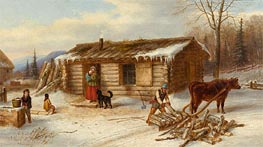
Habitant Homestead in Winter c.1860
Oil Painting
$1138
$1138
Canvas Print
$65.70
$65.70
SKU: KRC-10035
Cornelius Krieghoff
Original Size: 29.2 x 50.8 cm
Private Collection
Cornelius Krieghoff
Original Size: 29.2 x 50.8 cm
Private Collection
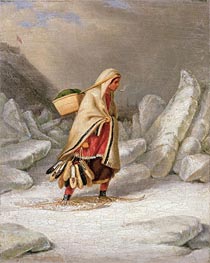
An Indian Woman Wearing Snowshoes n.d.
Oil Painting
$892
$892
Canvas Print
$65.70
$65.70
SKU: KRC-10036
Cornelius Krieghoff
Original Size: unknown
Private Collection
Cornelius Krieghoff
Original Size: unknown
Private Collection
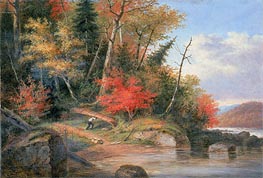
Carrying a Canoe to the River, St. Maurice n.d.
Oil Painting
$1086
$1086
Canvas Print
$65.70
$65.70
SKU: KRC-10037
Cornelius Krieghoff
Original Size: unknown
Private Collection
Cornelius Krieghoff
Original Size: unknown
Private Collection
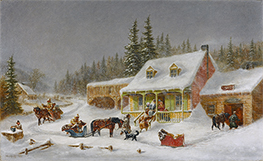
The Blacksmith's Shop 1871
Oil Painting
$1468
$1468
Canvas Print
$65.70
$65.70
SKU: KRC-10038
Cornelius Krieghoff
Original Size: 56.5 x 92.1 cm
Art Gallery of Ontario, Toronto, Canada
Cornelius Krieghoff
Original Size: 56.5 x 92.1 cm
Art Gallery of Ontario, Toronto, Canada
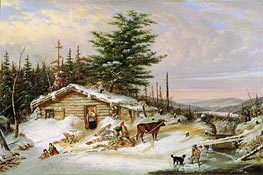
Settler's Log House 1856
Oil Painting
$1509
$1509
Canvas Print
$66.26
$66.26
SKU: KRC-10039
Cornelius Krieghoff
Original Size: 62.2 x 92.7 cm
Art Gallery of Ontario, Toronto, Canada
Cornelius Krieghoff
Original Size: 62.2 x 92.7 cm
Art Gallery of Ontario, Toronto, Canada
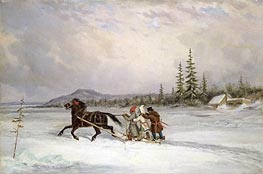
Habitants Sleighing c.1855
Oil Painting
$1024
$1024
Canvas Print
$65.70
$65.70
SKU: KRC-10040
Cornelius Krieghoff
Original Size: 30.8 x 45.7 cm
Art Gallery of Ontario, Toronto, Canada
Cornelius Krieghoff
Original Size: 30.8 x 45.7 cm
Art Gallery of Ontario, Toronto, Canada
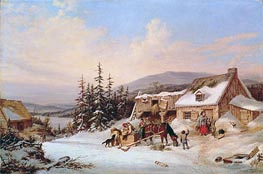
Quebec 1858
Oil Painting
$1503
$1503
Canvas Print
$65.70
$65.70
SKU: KRC-10041
Cornelius Krieghoff
Original Size: unknown
Private Collection
Cornelius Krieghoff
Original Size: unknown
Private Collection
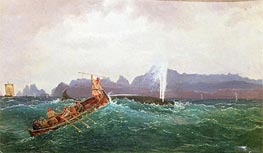
A Whaling Scene n.d.
Oil Painting
$994
$994
Canvas Print
$65.70
$65.70
SKU: KRC-10042
Cornelius Krieghoff
Original Size: unknown
Private Collection
Cornelius Krieghoff
Original Size: unknown
Private Collection
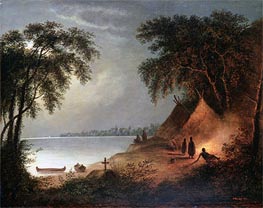
Indian Burial n.d.
Oil Painting
$975
$975
Canvas Print
$65.70
$65.70
SKU: KRC-10043
Cornelius Krieghoff
Original Size: unknown
Private Collection
Cornelius Krieghoff
Original Size: unknown
Private Collection
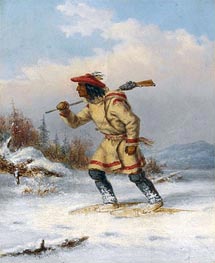
Following the Moose c.1860
Oil Painting
$877
$877
Canvas Print
$65.70
$65.70
SKU: KRC-10044
Cornelius Krieghoff
Original Size: 28.2 x 23.3 cm
Brooklyn Museum of Art, New York, USA
Cornelius Krieghoff
Original Size: 28.2 x 23.3 cm
Brooklyn Museum of Art, New York, USA
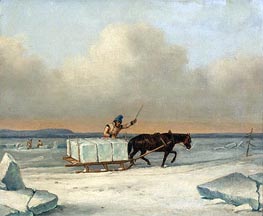
The Ice Cutters on the St. Lawrence at Longueuil 1850
Oil Painting
$901
$901
Canvas Print
$65.70
$65.70
SKU: KRC-10045
Cornelius Krieghoff
Original Size: 26.7 x 31.8 cm
Private Collection
Cornelius Krieghoff
Original Size: 26.7 x 31.8 cm
Private Collection
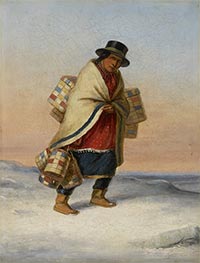
The Basket Seller c.1850
Oil Painting
$801
$801
Canvas Print
$65.70
$65.70
SKU: KRC-10046
Cornelius Krieghoff
Original Size: 24.8 x 18.9 cm
Art Gallery of Ontario, Toronto, Canada
Cornelius Krieghoff
Original Size: 24.8 x 18.9 cm
Art Gallery of Ontario, Toronto, Canada
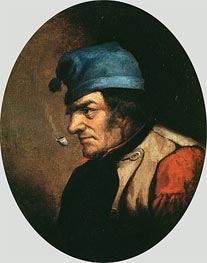
Habitant with Blue Tuque and Pipe 1850s
Oil Painting
$707
$707
Canvas Print
$65.70
$65.70
SKU: KRC-10047
Cornelius Krieghoff
Original Size: 30.8 x 25.2 cm
Art Gallery of Ontario, Toronto, Canada
Cornelius Krieghoff
Original Size: 30.8 x 25.2 cm
Art Gallery of Ontario, Toronto, Canada
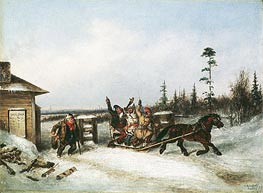
Running the Toll Gate 1857
Oil Painting
$1117
$1117
SKU: KRC-10048
Cornelius Krieghoff
Original Size: 33.7 x 45.7 cm
Art Gallery of Ontario, Toronto, Canada
Cornelius Krieghoff
Original Size: 33.7 x 45.7 cm
Art Gallery of Ontario, Toronto, Canada
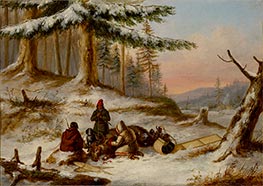
Moose Hunters c.1859
Oil Painting
$1086
$1086
Canvas Print
$65.70
$65.70
SKU: KRC-10049
Cornelius Krieghoff
Original Size: 30.2 x 42.2 cm
Art Gallery of Ontario, Toronto, Canada
Cornelius Krieghoff
Original Size: 30.2 x 42.2 cm
Art Gallery of Ontario, Toronto, Canada
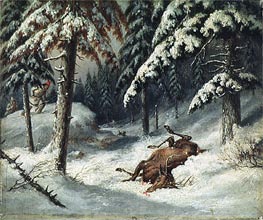
Cerf Mort n.d.
Oil Painting
$938
$938
SKU: KRC-10050
Cornelius Krieghoff
Original Size: 22.6 x 27 cm
Art Gallery of Ontario, Toronto, Canada
Cornelius Krieghoff
Original Size: 22.6 x 27 cm
Art Gallery of Ontario, Toronto, Canada
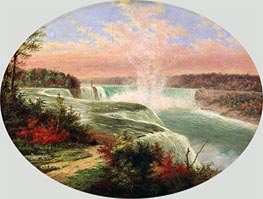
The Artist at Niagara n.d.
Oil Painting
$1082
$1082
Canvas Print
$65.70
$65.70
SKU: KRC-10051
Cornelius Krieghoff
Original Size: 38.2 x 51.5 cm
Art Gallery of Ontario, Toronto, Canada
Cornelius Krieghoff
Original Size: 38.2 x 51.5 cm
Art Gallery of Ontario, Toronto, Canada
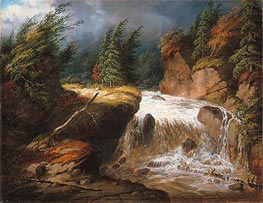
The Passing Storm, Saint-Ferreol 1854
Oil Painting
$1100
$1100
SKU: KRC-10052
Cornelius Krieghoff
Original Size: 39 x 50.2 cm
National Gallery of Art, Ottawa, Canada
Cornelius Krieghoff
Original Size: 39 x 50.2 cm
National Gallery of Art, Ottawa, Canada
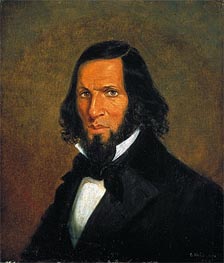
Self-Portrait 1855
Oil Painting
$879
$879
Canvas Print
$65.70
$65.70
SKU: KRC-10053
Cornelius Krieghoff
Original Size: 28.8 x 24.8 cm
National Gallery of Art, Ottawa, Canada
Cornelius Krieghoff
Original Size: 28.8 x 24.8 cm
National Gallery of Art, Ottawa, Canada
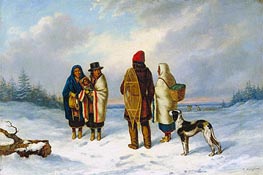
Indians in a Snowy Landscape c.1847/48
Oil Painting
$1063
$1063
SKU: KRC-10054
Cornelius Krieghoff
Original Size: 36.5 x 54 cm
National Gallery of Art, Ottawa, Canada
Cornelius Krieghoff
Original Size: 36.5 x 54 cm
National Gallery of Art, Ottawa, Canada
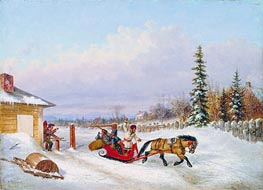
The Toll Gate 1861
Oil Painting
$1117
$1117
SKU: KRC-10055
Cornelius Krieghoff
Original Size: 33.4 x 46 cm
National Gallery of Art, Ottawa, Canada
Cornelius Krieghoff
Original Size: 33.4 x 46 cm
National Gallery of Art, Ottawa, Canada
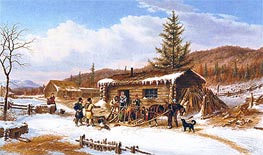
Return from the Hunt 1871
Oil Painting
$1442
$1442
Canvas Print
$65.70
$65.70
SKU: KRC-14820
Cornelius Krieghoff
Original Size: 57.2 x 94 cm
Art Gallery of Ontario, Toronto, Canada
Cornelius Krieghoff
Original Size: 57.2 x 94 cm
Art Gallery of Ontario, Toronto, Canada
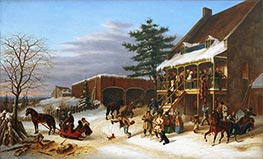
J. B. Jolifou, Aubergiste 1871
Oil Painting
$1906
$1906
Canvas Print
$65.70
$65.70
SKU: KRC-14821
Cornelius Krieghoff
Original Size: 55.9 x 92.1 cm
Art Gallery of Ontario, Toronto, Canada
Cornelius Krieghoff
Original Size: 55.9 x 92.1 cm
Art Gallery of Ontario, Toronto, Canada
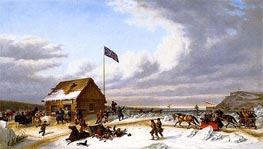
The New Year's Day Parade 1871
Oil Painting
$1607
$1607
Canvas Print
$65.70
$65.70
SKU: KRC-14822
Cornelius Krieghoff
Original Size: 64.3 x 109.2 cm
Public Collection
Cornelius Krieghoff
Original Size: 64.3 x 109.2 cm
Public Collection